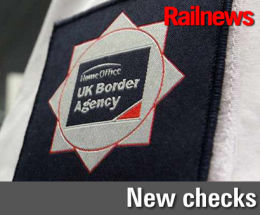Posted 8th April 2015 | 3 Comments
New passport rules could bring Eurotunnel to 'standstill'

NEW checks on people leaving the country have been introduced today, but the affect on travellers at ports, airports and international stations has varied.
The intention is to gather better information about who is in the United Kingdom, but Eurotunnel has warned that the predicted growth in international traffic could bring its business to a 'standstill' unless better technology is introduced soon.
The Home Office said the new rules, first set out in 2010 and given legal status last year, will create 'a much clearer picture of who is staying in the country when they have no right to be here'. The checks also include passport 'verification', which could add to the delays for some passengers. Passports are being scanned electronically by transport operators and then verified. At the start of the scheme only 25 per cent of scanned passports will be verified, but this is to increase to 100 per cent by early June.
The new system is not reported to be causing problems at airports, because airlines are providing information to the UK Border Agency from their passengers' travel documents. They already check passports before allowing passengers to board their aircraft, while outgoing passengers on Eurostar sre used to having their passports checked at St Pancras International by French immigration officials before joining their trains.
But Eurotunnel has warned of problems ahead. It has spent £2.5 million on new systems, changed the routes of vehicles at Folkestone and employed 50 additional staff.
Eurotunnel public affairs director John Keefe said: "Over the next five years we are looking at Eurotunnel growth of 20-25 per cent in passengers and 30 per cent in truck traffic. The Government's approach to managing the borders will bring them to a standstill -- we need smarter technology."
A Home Office spokesman added: "Due to the different environments and scale of operations at ports, delivery approaches will vary.
"The Home Office has worked with carriers and ports to allow them to introduce exit checks in a way that aligns with their existing systems, including taking a phased approach at some ports to help minimise the impact on customers and on port operations."
Security and immigration minister James Brokenshire explained: "It is right that we have an immigration system that is fair, that tackles illegal immigration and that clamps down on those who try to cheat the system by staying here when they have no right to do so.
"Exit checks will provide us with vital information that confirms a person's exit from the UK. The coalition Government committed to reintroducing them in 2010 and the Immigration Act 2014 put in place legislation which gave carrier and port staff the powers to carry out these checks.
"Port and travel operators are experts in their business and know their customers best, which is why we've supported them to design and trial the systems for collecting data in a way that will minimise the impact."
Reader Comments:
Views expressed in submitted comments are that of the author, and not necessarily shared by Railnews.

Niall Smith, Hamburg, Germany
Will there be border officials on hand to persuade the desperately needed qualified outgoing migrants to stay?
Graham Wickenden, Hook
The passport checks being introduced are on the way out; so why go to the effort, expense and time of further checks which would be required if fingerprints were also being checked? As if there are any miscreants, all this will do is confirm they are leaving the UK so will be no longer our problem.
Timothy Bergin, Manchester
Passports are only as good as they can be but if you were to combine fingerprint evidence at the same time then the system would be foolproof, this would much more efficiant in being able to identify a person or persons and keep put unwanted miscreants!